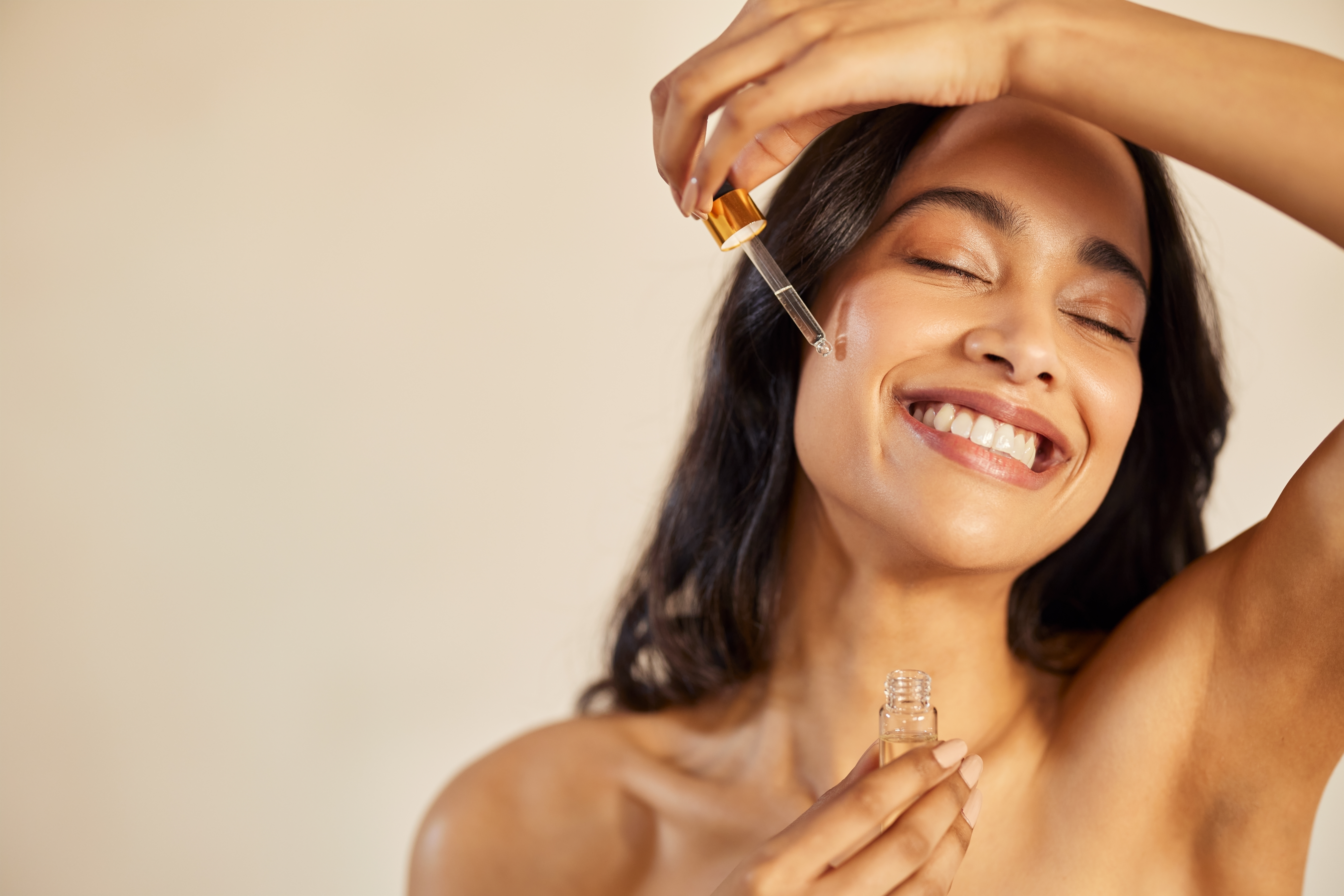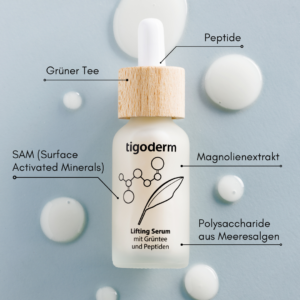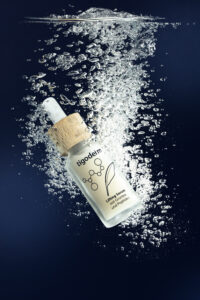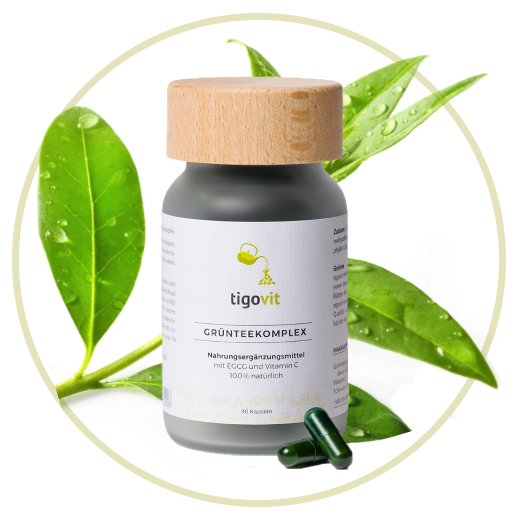
Peptides? What are they? What does it have to do with natural cosmetics? In this article, we not only explain what peptides are, but also reveal the secret of their transformative power in skincare. The natural and targeted effect of peptides on the skin's ageing processes does not promise anti-ageing, but beautiful ageing - sustainably beautiful, smooth and radiant skin.
The benefits of peptides for the skin in a nutshell
- Skin regeneration and anti-ageing:
Peptides can stimulate collagen production, helping to reduce fine lines and wrinkles and embody a youthful glow.
- Moisture binding and protection:
Peptides help the skin to retain moisture and at the same time strengthen the skin barrier to protect it from external influences. - Targeted treatments:
A variety of peptide formulas can address a wide range of skin concerns, from hyperpigmentation to sensitive skin.
What are peptides?
Peptides are short chains of amino acids (up to approx. 50 amino acids), while proteins form long chains of amino acids. They play a decisive role in many biological processes in our body: they can be signalling molecules such as hormones, transporters, structural elements such as collagen, motors or catalysts (enzymes). But their capabilities go far beyond known systems. In the world of cosmetics, peptides are now enjoying success and great popularity due to their effectiveness for radiant skin and beautiful ageing.
What types of peptides are there?
Various types of peptides are used in cosmetics due to their diverse functions and benefits. Here are some of the most common types of peptides used in cosmetics, along with examples of their applications:
- Signalling peptides: These peptides send signals to the skin cells to regulate certain functions. One example is hexapeptide-11, which stimulates collagen production and improves skin firmness.
- Carrier peptides: These peptides serve as "transporters" for other active ingredients in order to channel them into the target tissue. One example is palmitoyl tripeptide-1, which promotes skin regeneration and improves the absorption of other ingredients.
- Mimetic peptides: This very special class of peptides mimics the functions of natural skin molecules to achieve specific results. For example, the mimetic peptide Crystalide stimulates the molecule α-A-crystallin, the so-called "highlighter protein". It ensures softness, elegant radiance and transparency of the so-called "glass skin". More about the crystallide peptide below in detail.
- Enzyme inhibitor peptides: These peptides inhibit the activity of certain enzymes in the skin that are responsible for the breakdown of collagen and elastin. One example is tripeptide-1, which reduces the activity of enzymes that break down collagen in order to slow down skin ageing.
- Growth Factor Peptide: These peptides mimic the action of natural growth factors in the skin to promote cell regeneration and healing. One example is palmitoyl tripeptide-5, which stimulates the production of collagen and elastin to improve skin texture and reduce fine lines and wrinkles.
These types of peptides are used in a variety of skincare products such as creams, serums, masks and treatments to treat various skin problems and maximise the feeling of comfort and beauty in your own skin.

Excursus: Skin like a piece of crystal - Crystalide peptide, a special mimetic peptide
The cystalide peptide is a bioharmonic peptide that Promotes the formation of the endogenous protein α-A-crystallin. Approximately 50% of α-A crystallin is present in the crystalline lens and the remainder is distributed to other tissue layers, including the skin. The α-A crystallin is a chaperone protein, a kind of "chaperone". It ensures that other newly formed proteins fold correctly and protected and thus get into the right shape. It also appears to play an important role in protecting against oxidation, i.e. protecting other molecules and structures from oxidative stress.
Stimulates the formation of α-A crystalline
n skin care, increased formation of α-A crystalline is synonymous with transparency and radiance of the skin. It provides a crystal-clear, pure complexion, full of natural highlight effects and thus ensures a skin appearance of lightness and fineness, as is currently on everyone's lips with "glass skin". The active peptide is palmitoyl tetrapeptide-10 (sequence Pal-Lys-Thr-Phe-Lys; KTFK). It maintains the proteostasis of alpha-crystallin and thus mechanisms that control protein synthesis, conformation, degradation and aggregation. It thus maintains the skin's radiance using the body's own resources and forces.
Collagen-forming and promotion of keratinocyte formation
Crystalide peptides also promote the skin's natural exfoliation and desquamation processes, regulate the rate of skin cell self-renewal and the rate of keratinocyte maturation (keratin-producing cells). They thus ensure clear skin with a harmoniously even tone and healthy, clear skin - like a piece of crystal.
This class of peptides is therefore the best choice when it comes to collagen formation, a highlighter effect and cell renewal at a natural level. The skin appears naturally radiant and youthful.
Ideal in combination - peptides, plant extracts and activated minerals
Peptides are therefore unique and extremely effective in skincare, as we have now learnt. The effect of peptides in a good skincare product can be even greater when they are combined with other highly effective ingredients such as green tea extract, magnolia extract and SAM (Surface Activated Minerals) silicon. The Collagen formation is supported by peptides and silicon, green tea extract with EGCG (epigallocatechin) provides one of nature's strongest antioxidants to protect against environmental influences, UV radiation and oxidative stress. Magnolia bark extract has been ascribed antimicrobial protection in ancient traditions, i.e. a supportive component for skin impurities and redness.
Peptide-based formula with green tea, magnolia and SAM silicon
Natural beauty draws its strength from nature - so good cosmetic products also draw on the powerful active ingredients from the great world of plants. Combined with modern science, technology and biochemistry, finely tuned formulations can give natural cosmetics an elegant boost that pays off. Feeling good in your own skin means soft, pure and delicate skin, a healthy, smooth complexion that ideally comes from within - but can be well supported and activated from the outside. https://tigogreen.de/produkt/tigoderm-lifting-serum/

Crystalide peptides:
stimulate collagen production, a radiantly soft complexion and natural highlights like the well-known "glass skin". The peptide bears its name for a reason: it promotes the formation of the body's own protein α-A-crystallin, which acts as a "highlighter protein" to reveal a delicate, youthful complexion and boost radiance.
Green tea: The young leaves of the green tea plant Camellia sinensis are filled to the brim with valuable plant substances such as chlorophyll, polyphenols and tannins. The most important representatives are the catechins, especially epigallocatechin gallate - EGCG. It is one of nature's strongest antioxidants and helps to protect the skin against environmental influences such as UV radiation, stress and premature ageing processes - which usually result in unpopular wrinkles. EGCG provides an antioxidant basis to counteract these processes and ensure beautiful ageing across the board
Silicon / Surface activated minerals (SAM): Silicon is clearly one of the top skin minerals. Silicon helps the skin to retain moisture - silicon can absorb 300 times its own weight in water. It ensures firmer skin by promoting collagen production. The production of elastin is also dependent on silicon. However, silicon per se is poorly bioavailable, which is why care should be taken when buying cosmetics as to where the silicon comes from. Technologies such as SAM technology - abbreviation for "surface activated minerals" - are ideal. The silicon is broken down and the surface activated, which demonstrably increases bioavailability.https://www.rilling-healthcare.de/silizium-in-der-wissenschaft/
Magnolia bark extractMagnolia officinalis, known for its fragrance, beauty and elegance, not only enchants with its flowers, but also provides high-quality, powerful antioxidants and antimicrobial molecules from the bark. One decoded substance is honokiol, which has been known and valued for centuries in the Japanese plant tradition.
Conclusion: Nature and science in combination - the secret of beauty & care
The key to natural beauty and eternal youth therefore lies neither in the pure plant tradition nor in the industrial production of cosmetics. Rather, it is a finely tuned mixture of bio-harmonic molecules such as peptides, especially crystallide peptides. They stimulate collagen production and natural crystalline proteins in order to create a youthful, radiant complexion from the skin's own resources. Peptides are the body's own molecules which, when applied externally, can stimulate and promote further supportive processes in the skin. Peptides are a simple and effective contribution in the skin care of serums and creams to maximise the feeling of well-being and beauty in your own skin - regardless of age.
We recommend peptide-based formulations with antioxidant-rich plant extracts such as green tea extract and magnolia extract as well as an activated form of the No. 1 skin mineral silicon.




Leave a Reply